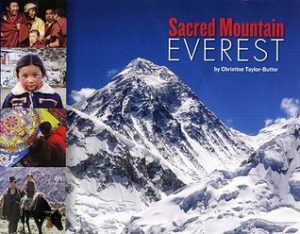 Includes social studies projects taken from the ancient Chinese.
Includes social studies projects taken from the ancient Chinese.
Nonfiction
Nonfiction genre
The King Who Barked: Real Animals Who Ruled
Could an animal really hold an important office? It’s happened: Incitatus the horse was made a consul in the Roman Empire. He had a marble stable, eighteen servants, and ate oats mixed with flakes of gold. Then there was Saur, a dog declared king during the days of the Vikings, who signed decrees with his paw. And one can’t forget Pigasus, nominated as presidential candidate by a group of Vietnam War protestors, or Clay Henry the goat and his descendants, who became mayors of a small Texas town. The government truly has gone to the dogs–and to the cats, mules, and elephants too–as shown in this fascinating and engaging history.
Balarama: A Royal Elephant
The authors recount how the trained elephants of southern India, in particular the one chosen to be the lead elephant in the Mysore Dasara, are raised, cared for, and prepared for performing in ceremonial processions.
Sacred Mountain: Everest
 A cultural, geological, and ecological history of Mount Everest focusing on the indigenous Sherpa and their spiritual connection to the mountain, record-setting multinational climbing expeditions, and the effects of tourism on the environment. Illustrated with photographs, maps, diagrams, and timelines.
A cultural, geological, and ecological history of Mount Everest focusing on the indigenous Sherpa and their spiritual connection to the mountain, record-setting multinational climbing expeditions, and the effects of tourism on the environment. Illustrated with photographs, maps, diagrams, and timelines.
Flags Of The World
 In this complete compendium of the world’s flags, each nation’s flag is paired with facts and tidbits of history. These flags provide a window into the histories, values, and cultures of countries around the world. Waving in the wind, a flag may not seem like a code. But hidden in the stripes, stars, suns, moons, and colors of the world’s flags are the keys to understanding different countries’ shared histories and cherished ideals. Flags do much more than identify countries and groups of people. In every color, pattern, and design, the citizens and governments of countries announce their allegiances and herald their history. If you know what to look for, a flag can reveal major insights into another country’s history and culture.
In this complete compendium of the world’s flags, each nation’s flag is paired with facts and tidbits of history. These flags provide a window into the histories, values, and cultures of countries around the world. Waving in the wind, a flag may not seem like a code. But hidden in the stripes, stars, suns, moons, and colors of the world’s flags are the keys to understanding different countries’ shared histories and cherished ideals. Flags do much more than identify countries and groups of people. In every color, pattern, and design, the citizens and governments of countries announce their allegiances and herald their history. If you know what to look for, a flag can reveal major insights into another country’s history and culture.
The Roman Gladiators (Ancient And Medieval People)
An introduction to the history and lifestyle of Roman gladiators.
The Japanese Samurai
The Japanese Samurai details famous samurai battles in Japan. Readers learn about samurai swords, the Bushido code, and the decline of the ancient samurai. Part of the Ancient and Medieval People series, which profiles some of the fiercest warriors in history.
The Lake Atitlan Reference Guide
 The Lake Atitlan Reference Guide is an eco-cultural guide to the lake identified by Aldous Huxley (Brave New World) as “the most beautiful lake in the world.” Atitlan is a volcanic caldera, located at 5,000 ft above sea level in the Mayan highlands of Guatemala. Atitlan means “at the water.” It is a fusion of simple Nahuatl words that belies the complexity of the entity it identifies. Lake Atitlan is both a place and an event in motion. Its life incorporates the visually stunning character of one of nature’s most ambitious creations and the extraordinarily diverse cultural character of the human life that the Lake has drawn to its shores. Atitlan was born violently, long ago, probably before the emergence of man here. Scientists still debate the exact nature of its birth, an event which created a nearly circular depression of 11 miles in diameter, 95 square miles of area, and over 1,000 feet deep. The cause of this huge cavity, a chain of events which began with an immense eruption, produced a unique microenvironment that has been drawing wanderers to the Lake’s shores for at least thousands of years. Cultures have clashed to control it. Vagabonds have been absorbed by it, laid down roots, and quit “moving on.” Traveling notables have been overwhelmed by its beauty and written about it in the loftiest of terms. Any effort to empirically order the kaleidoscope of its elements is ultimately challenged by the spiritual and physical immensity of the subject. This work makes no such attempt. What is offered here instead is a summary of the Lake environment in terms of its physical location and nature, its cultural history, and its contemporary political and socioeconomic life. The text is supported by more than 100 quality fotos (most in color) and a variety of other illustrations.
The Lake Atitlan Reference Guide is an eco-cultural guide to the lake identified by Aldous Huxley (Brave New World) as “the most beautiful lake in the world.” Atitlan is a volcanic caldera, located at 5,000 ft above sea level in the Mayan highlands of Guatemala. Atitlan means “at the water.” It is a fusion of simple Nahuatl words that belies the complexity of the entity it identifies. Lake Atitlan is both a place and an event in motion. Its life incorporates the visually stunning character of one of nature’s most ambitious creations and the extraordinarily diverse cultural character of the human life that the Lake has drawn to its shores. Atitlan was born violently, long ago, probably before the emergence of man here. Scientists still debate the exact nature of its birth, an event which created a nearly circular depression of 11 miles in diameter, 95 square miles of area, and over 1,000 feet deep. The cause of this huge cavity, a chain of events which began with an immense eruption, produced a unique microenvironment that has been drawing wanderers to the Lake’s shores for at least thousands of years. Cultures have clashed to control it. Vagabonds have been absorbed by it, laid down roots, and quit “moving on.” Traveling notables have been overwhelmed by its beauty and written about it in the loftiest of terms. Any effort to empirically order the kaleidoscope of its elements is ultimately challenged by the spiritual and physical immensity of the subject. This work makes no such attempt. What is offered here instead is a summary of the Lake environment in terms of its physical location and nature, its cultural history, and its contemporary political and socioeconomic life. The text is supported by more than 100 quality fotos (most in color) and a variety of other illustrations.
The Amazon Rain Forest (Nature’s Wonders)
Presents comprehensive information on the geography, history, wildlife, peoples, and environmental issues of the Amazon Rain Forest.

